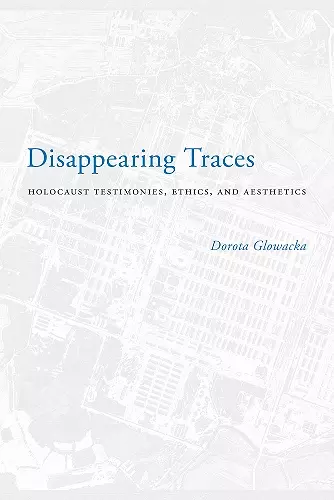Disappearing Traces
Holocaust Testimonials, Ethics, and Aesthetics
Format:Paperback
Publisher:University of Washington Press
Published:1st Oct '12
Currently unavailable, and unfortunately no date known when it will be back
This paperback is available in another edition too:
- Hardback£95.00(9780295991689)

This book is very profound. Every time Glowacka introduces a major thinker into her consideration of the questions at hand she adds a much deeper understanding not only of the question but also of the thinker. This is a must read for Holocaust scholars and teachers. -- David Patterson, Hillel Feinberg Chair in Holocaust Studies, University of Texas at Dallas Dorota Glowacka's impassioned and eloquent dialogue with the philosopher Emmanuel Levinas makes a persuasive case for translating his ethics into a poetics (what she calls poethics) that powerfully illuminates post- Holocaust philosophy, literature, and visual art. -- Karyn Ball, author of Disciplining the Holocaust
Examines the tensions between the ethical and aesthetic imperatives in literary, artistic, and philosophical works about the Holocaust
In Disappearing Traces, Dorota Glowacka examines the tensions between the ethical and aesthetic imperatives in literary, artistic, and philosophical works about the Holocaust, in a search for new ways to understand the traumatic past and its impact on the present. She engages with the work of leading 20th-century philosophers and theorists, including Levinas, Benjamin, Lyotard, and Derrida, to consider the role of language in the construction and transmission of traumatic memories; the relation between self-identity and the act of bearing witness; and the ethical implications of representing trauma.
Glowacka's work draws on a wide range of discourses and disciplines, bringing into conversation various genres of writing and artistic production. It reveals the need to find innovative idioms and new means of engaging with the past, and to create alliances between different disciplines and modes of representing the past that transform and transcend existing paradigms of representation.
"This book is very profound. Every time Glowacka introduces a major thinker into her consideration of the questions at hand she adds a much deeper understanding not only of the question but also of the thinker. This is a must read for Holocaust scholars and teachers." David Patterson, Hillel Feinberg Chair in Holocaust Studies, University of Texas at Dallas "Dorota Glowacka's impassioned and eloquent dialogue with the philoso--pher Emmanuel Levinas makes a persuasive case for translating his ethics into a poetics (what she calls "poethics") that powerfully illuminates post-Holocaust philosophy, literature, and visual art." Karyn Ball, author of Disciplining the Holocaust
ISBN: 9780295991696
Dimensions: unknown
Weight: 476g
304 pages